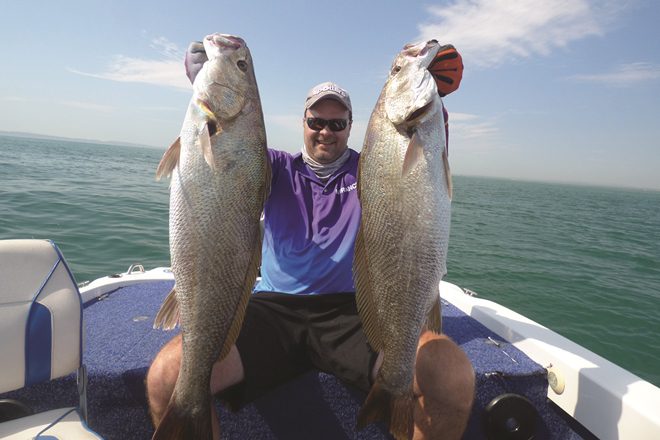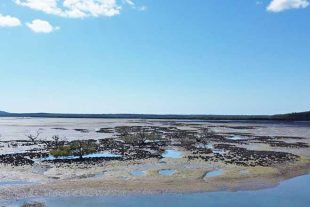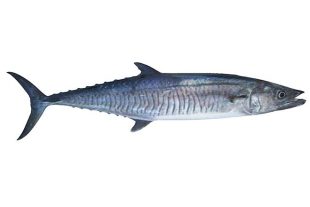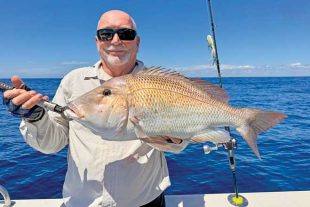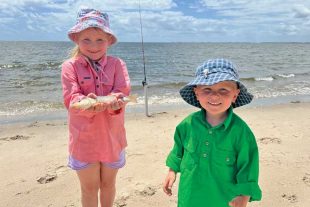MUCH-needed rain and increasing water temperatures in October will help with fishing efforts during November.
Hot weather in late September and early October saw the water temperature jump 4C in just a couple of weeks and at the time of writing most areas have about 24C surface temperature, which will make a number of species more active this month. November would probably be my favourite month of the year to target jewfish, both for number and size, and the rain and water temps are encouraging factors. A few different deepwater locations from Brisbane to the Gold Coast will traditionally hold big schools of large jewfish during the month.
Finding and targeting
Using my Simrad sounder to locate any schools of fish is the first step I take when hitting the water to target jewfish. Setting the sounder’s side scan very wide helps cover ground quickly. I usually have my unit set at 40-50m scan on each side of the boat when in over 10m of water. Once I find a school, I try to position the boat in a way that allows me to drift my lures through it. I do this in two different ways when trying to target jewfish.
One, by positioning the boat on top of the school and casting my lures up-current of the school, letting me drift them back through; the other, by positioning the boat up-current of the school and then dropping the lures down and drifting the boat and lures together into the school. I often use the first technique because I find it a lot easier to position the boat near the fish and confidently cast my lures far enough to sink into the strike zone where I can see the fish with my sounder.
Drifting the lures and boat onto the fish can be trickier to do because the schools can move from side to side in the current, which can make a well-planned drift unsuccessful. However, if you can drift the lures and boat together onto the school successfully, it’s usually the more likely technique to get a bite from these sometimes fussy fish.
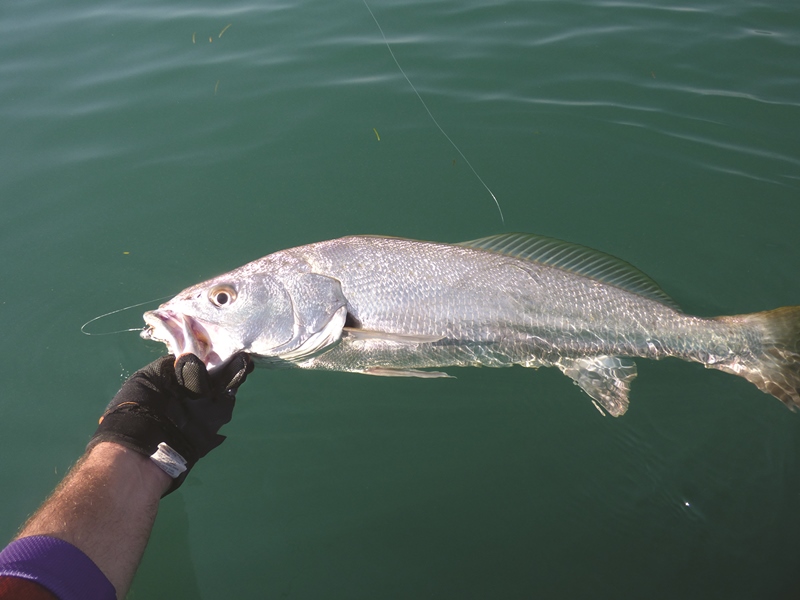
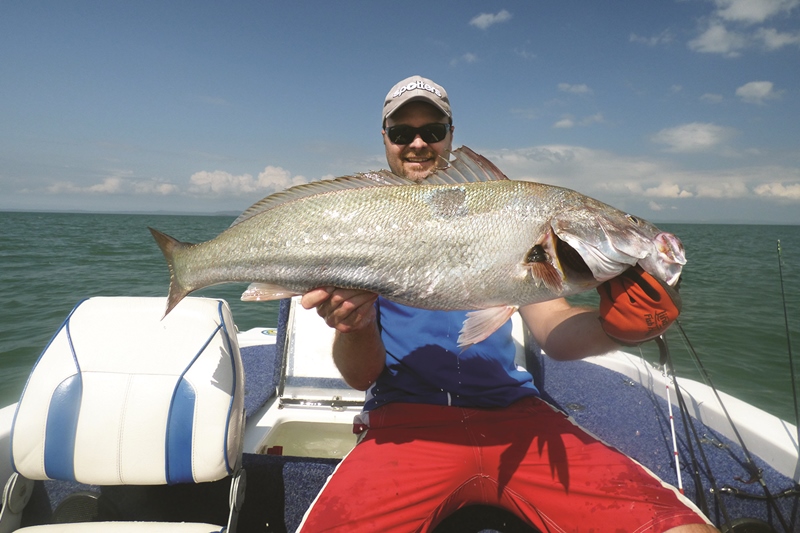
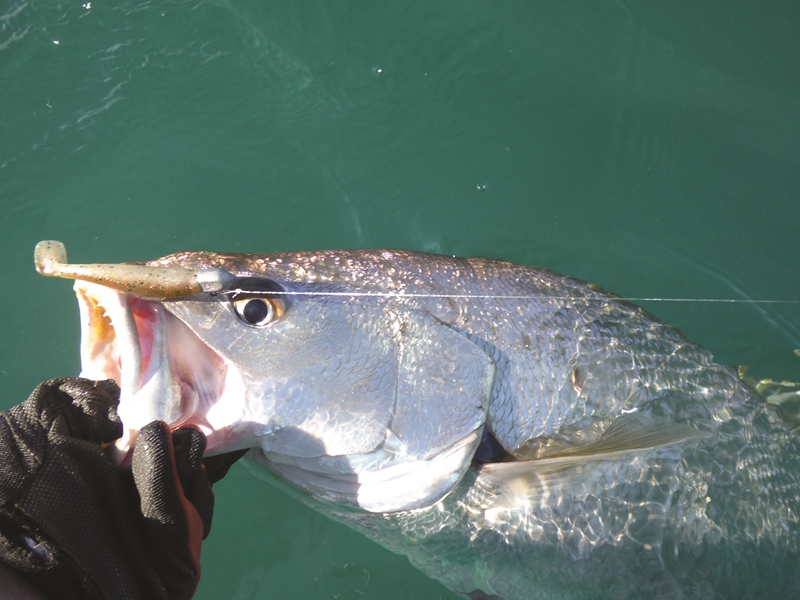
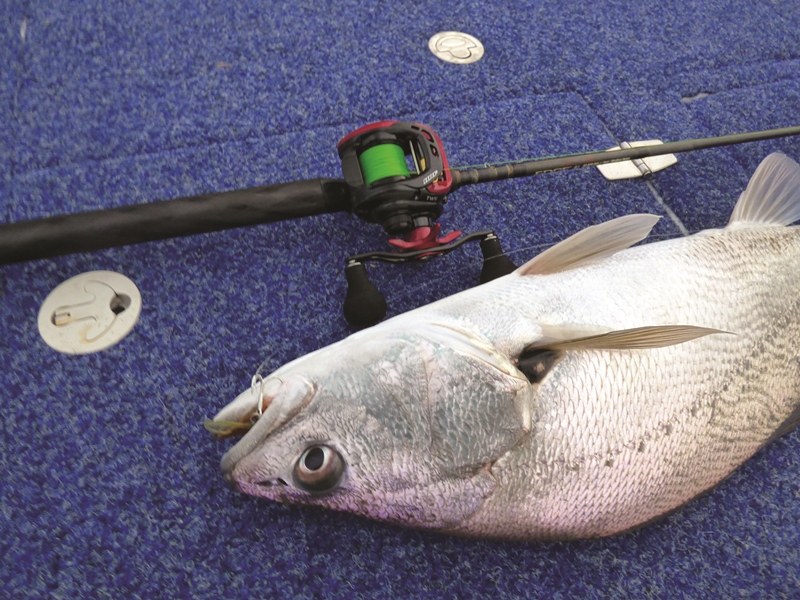
I often see people going to target jewfish with tackle I feel is too light. The argument of having fun is fine but getting the fish in faster is better for both the angler and fish. Baitcast and spin tackle with a rating over 6kg spooled with 20-40lb braid with 20-50lb leader is my preference because it gets the fish in quicker so I can catch more and release them in better condition. Jew will not usually rub through the leader but a heavier leader allows you to pull harder on the fish. Lure weights can vary and I usually match my rod reel combos to the different weighted lures. Basically, I will use a heavy rod with a heavy lure and a lighter rod with a lighter lure. I prefer to use baitcast outfits most of the time because I find they cast heavier lines with ease and are very light and well balanced.
Lures
I usually target jewfish with three different lure types: soft plastics, vibes and jigs. My first preference is to use jigs on schooling jew in deep water because these lures get to the bottom and the strike zone very quickly. If the fish are less aggressive, I prefer using vibes, both soft and hard. Vibes will still get to the bottom pretty quickly, but they also generate a large amount of vibration for the fish to home in on. The subtlest presentation is the plastic and it can be very effective when the fish are hard to get a bite from. Starting with a larger plastic and heavier jig head, I’ll work my way down to a smaller plastic and lighter jig head until I crack the fish and work out a pattern to their bite.
Keeping a feed
In Queensland, jewfish have a minimum size limit of 75cm and a bag limit of two fish per person. I think this is one of the strictest limits of any species, so don’t feel bad taking some home to eat. I like to fillet my jewfish, then cut the fillets into small, thin pieces, crumb them with panko and fry them. Some people don’t like the taste of jewfish but I’m yet to find someone who hasn’t liked the fish I have cooked for them.
 Bush ‘n Beach Fishing Magazine Location reports & tips for fishing, boating, camping, kayaking, 4WDing in Queensland and Northern NSW
Bush ‘n Beach Fishing Magazine Location reports & tips for fishing, boating, camping, kayaking, 4WDing in Queensland and Northern NSW

